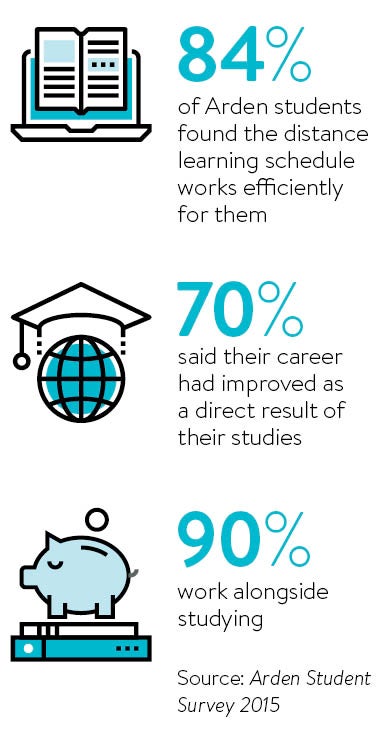We are living in an age of disruption – Trump, Brexit, climate change and the rapid evolution of digital technologies. To navigate this shifting and volatile environment takes a new set of skills that the corporate world is only beginning to grasp.
“Leading change is one of the greatest challenges for CEOs today,” says Dr Philip Hallam, vice chancellor of Arden University. “Business environments across the world are now interconnected at the speed of thought. The one certainty about the future is that the pace of change will only quicken.”
 Bosses across the globe are increasingly recognising that leadership skills and management education are critical if their businesses are to navigate today’s complex and fast-paced global marketplace. Corporations also have to see beyond the horizon if they’re to prevent their business models from being out-innovated.
Bosses across the globe are increasingly recognising that leadership skills and management education are critical if their businesses are to navigate today’s complex and fast-paced global marketplace. Corporations also have to see beyond the horizon if they’re to prevent their business models from being out-innovated.
“Every chief executive is trying to figure out how to gain competitive advantage in the face of disruptive market conditions,” explains Dr Hallam, who heads up the first dedicated online and blended university to be launched since the Open University was formed more than 50 years ago.
“The real issue for today’s managers is clearly focused on people. It’s about developing world-class talent, attracting and retaining it – and at the heart of this leadership challenge is education.”
The explosion of data, as well as complex and disruptive technologies in a rapidly changing globalised environment, certainly requires nimble chief executives. Many of today’s leaders were trained in an analogue world, yet they now have to steer the corporate ship and innovate in digital waters.
“In this new era, leadership is one of the most difficult capabilities to perfect. So it’s not surprising that post-graduate education is the X-factor and the currency for success,” says Matthew Cooper, director of postgraduate programmes at Arden University.
The big issue is whether higher education is necessary for success at the top of business. Many cite Jamie Oliver, Lord Alan Sugar or Sir Richard Branson as proof that leading profitable business empires isn’t dependent on a piece of paper. Of course they’re right. A degree or postgraduate qualification isn’t inherently linked to boardroom stardom.
It’s about developing world-class talent, attracting and retaining it – and at the heart of this leadership challenge is education
“However, the argument becomes null and void when you ask whether gaining a degree helps executives to get ahead in business and rise up to become corporate leaders. The fact is it can and it does,” says Mr Cooper.
A study by Forbes magazine found that pay was 50 per cent higher for those who have completed an MBA, rising to more than 80 per cent more for MBA graduates after five years. Those with a Master’s degree have been shown to earn 18 per cent more than their colleagues who are only educated to undergraduate level.
“I’ve been in touch with over 300 Arden University MBA alumni for feedback on their learning experience. Some achieved promotion, others started a business and became their own CEO. For quite a number, new skills meant a pay rise. One MBA graduate contacted me to say he has achieved a significant salary increase and is now able to work as an adviser to his company’s vice president,” says Mr Cooper.
The issue is that many universities and colleges across the UK aren’t adapting their business-focused education quickly enough to meet the changing needs of global commerce. Take for instance cyber security, which is a growing issue. There is now a shortage of skills in this area of expertise from the chief executive downwards.
It is predicted there will be a shortfall of 1.5 million workers worldwide in this sector by 2020, according to the government’s Global Information Security Workforce Study. This comes at a time when Whitehall is investing £2 billion in this sector.
“This is no longer just an issue for the IT department, but for the world workforce. Cyber skills need to reach into every profession,” according to chancellor Philip Hammond.

In response to this announcement, Arden University, which operates campuses in Ealing and Tower Hill in London, created an MSc in IT security management to assist and bridge this skills gap.
“It is imperative that business leaders upskill themselves and their workforce in data analytics and other emerging fields,” says Dr Hallam. “Arden’s educational approach is cutting edge and, combined with our bespoke online virtual learning environment, creates a powerful set of tools for students to engage with and learn from.”
Arden, which has supported more than 50,000 students over 25 years, now uses interactive student forums, real-time webinars and peer-to-peer study groups that span continents and cultures in terms of the students taking part.
“Particularly with our MBA programme, this environment provides an ideal setting for developing the business leaders of the future who are able to compete and understand business issues on a global stage,” says Mr Cooper.
While technology is proving to be a game-changer in industry after industry, this is also true for education. “Establishments like Arden also capitalise on this too. Our courses help utilise the growing array and performance of devices from smartphones to tablets. It is clear to see why digital learning has had such an impact on MBA and postgraduate study,” he says.
Traditional online learning programmes have sought to replicate the traditional “talk and chalk” classroom environment. Current innovations in education create a student experience through a virtual environment that is collaborative, engaging and tailored to the person who is trying to learn.
It is called the “flipped classroom” model, where students are in control of the pace of learning. They can also navigate learning materials on the go and access information in bite-sized pieces on their tablets or devices, wherever they are, as well as take part in regular face-to-face sessions when needed.
Mr Cooper concludes: “In this on-the-go digital age, it helps if resources can be accessed in formats adapted to suit the needs of the busy executive, including videos, journal articles, case studies, podcasts and presentations. These can be viewed at their own convenience. It’s about meeting the education needs of the 21st-century business person with 21st-century resources.”
For more information please visit arden.ac.uk/upskill or call 0808 231 1119


